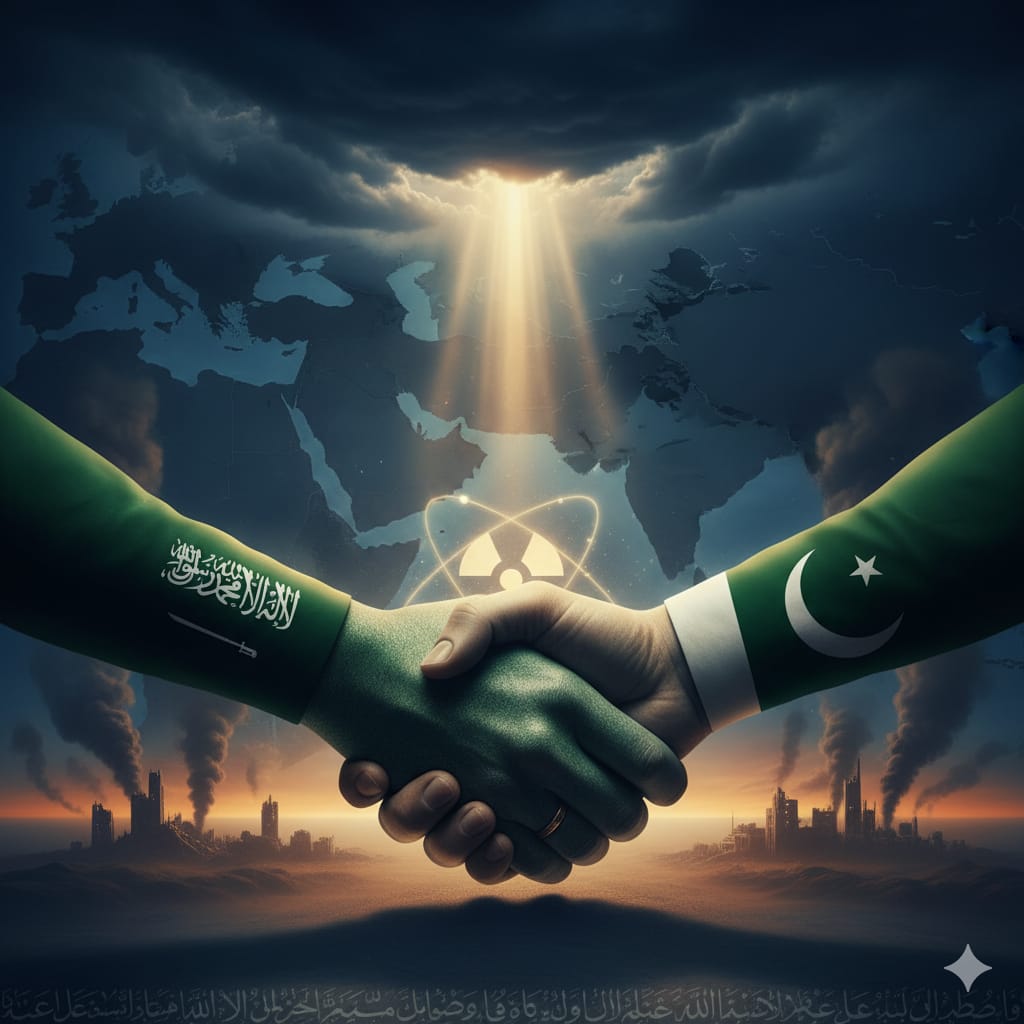Guardians of the Two Holy Mosques?
Saudi-Pakistan’s New Defense Alliance and the Future of the Muslim World
This morning, a remarkable announcement caught global attention: Saudi Arabia and Pakistan have finalized a NATO-style defense pact, officially named the Strategic Mutual Defense Agreement (SMDA).
Under this historic agreement, Saudi Arabia—though not a nuclear power—has been granted access to nuclear technology, signaling a transformative shift in Middle Eastern geopolitics.
Prime Minister Shehbaz Sharif received a purple carpet reception in Riyadh, while Crown Prince Mohammed bin Salman (MBS) personally welcomed him with a fervent salute. The question now echoes across the Muslim world:
Have we become the custodians (Pasban) of the Two Holy Mosques (Haramain Sharifain)?
Have the two brotherly nations finally joined hands against a common enemy?
Will this alliance bring relief to the oppressed Palestinians?
Yet, a sense of skepticism lingers. As the poet says:
Tairay vaaday pe jiyay hum tou yeh jaan jhoot jaana,
Ke khushi se mar na jaate, agar aitbaar hota.
(We lived on your promise, but know that this was a lie,
For we would have died of joy, had we truly believed.)
Is this agreement truly the dawn of a new era, or should we hold our breath and wait for its results?
The SMDA: A Strategic Shift or Symbolic Gesture?
The Saudi-Pakistan SMDA carries deep implications across two dimensions:
- The current Arab-Israel crisis in the Middle East
- The historic relationship and shared experiences of Saudi Arabia and Pakistan
For decades, both nations have walked a delicate path between faith, politics, and global power dynamics. Today, they stand at another crossroads.
Palestine: The Question That Remains Unanswered
The crisis in Gaza continues unabated. Despite enormous American military aid, humanitarian blockades, and geopolitical maneuvering, the situation has only worsened.
Recent reports reveal 16,000 new settler permits issued in the West Bank, crossing red lines even for allies like the UAE, which threatened to reconsider its role in the Abraham Accords.
Meanwhile, Qatar, a key U.S. ally, has been caught in the storm—hosting Hamas leaders in Doha, only to face renewed pressure.
Even the OIC (Organization of Islamic Cooperation), in its 2025 declaration, failed to mention Palestine meaningfully in its opening points. Its calls for “peace” rang hollow in the face of reality.
The question echoes again:
Can a defense alliance between Muslim powers like Saudi Arabia and Pakistan bring hope to Palestine, or is this simply another geopolitical maneuver?
MBS and Pakistan: Calculated Moves and Shared Interests
Mohammed bin Salman is known for his bold and often surprising decisions. In choosing Pakistan over Yemen as a strategic partner, MBS appears to favor a defensive alliance rather than another proxy war.
This move signals recognition of Pakistan’s military strength, nuclear capability, and religious legitimacy as the guardians of the Islamic cause.
Despite past tensions—ranging from Saudi aid fatigue to differing stances on Yemen and Kashmir—the shared need for security, stability, and regional influence has rekindled cooperation.
A Glimpse into History: The U.S., Pakistan, and Saudi Arabia
This alliance echoes the Cold War era, when Saudi Arabia, Pakistan, and the United States united to defeat Soviet socialism in Afghanistan.
Today, a similar coalition seems to be forming—this time against emerging regional threats, including Iran, Israel’s militarism, and China’s growing influence.
According to the book “No Exit from Pakistan”, the U.S. aims to counter China’s Belt and Road Initiative—especially in Gwadar and Balochistan. The rising unrest in Balochistan may not be a coincidence; it reflects the intersection of American, Chinese, and Pakistani interests.
As Prime Minister Shehbaz Sharif prepares for a potential White House visit, the SMDA could become a globally recognized agreement—but not without domestic challenges.
The Spiritual Dimension: Hope Amidst Hardship
Despite political complexities, many see divine wisdom at work. This alliance may signal that Allah’s mercy still guides the weak and the sinful toward righteous action.
“There is no power nor strength save in God” (La Hawla wa la Quwwata illa Billah).
Perhaps this is a moment for repentance, revival, and unity—a chance for the Muslim Ummah to reclaim its purpose.
Lessons from the Past, Prayers for the Future
Though Saudi-Pakistan relations have seen ups and downs—aid fluctuations, differing visions, and regional politics—the shared faith, strategic need, and geopolitical realities have brought them back together.
Now, as both nations stand united under the SMDA, the hope is not just for military strength, but for moral clarity—to stand for justice, Palestine, and the Muslim Ummah.
“Our Lord, indeed we have heard a caller calling to faith, [saying], ‘Believe in your Lord,’ and we have believed…”
(Surah Al ‘Imran 3:193–194)
May Allah grant this alliance sincerity, strength, and success—for the protection of faith, freedom, and the oppressed.
Conclusion: Dawn or Mirage?
The SMDA may represent a turning point in Muslim geopolitics—a potential step toward unity and strategic empowerment.
But whether it becomes a true alliance for justice or remains another symbolic gesture depends on actions, not just words.
The world watches. The oppressed wait. The faithful pray.
Will Saudi Arabia and Pakistan rise as true custodians of the Muslim cause—or will history repeat itself?


